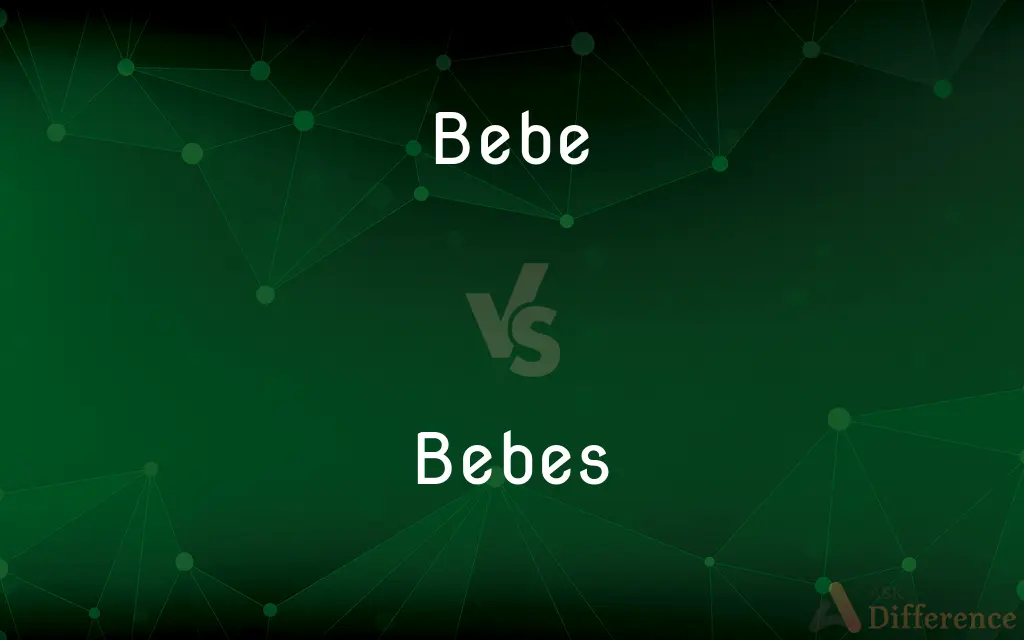Bebe vs. Bebes — What's the Difference?
By Tayyaba Rehman — Published on January 29, 2024
"Bebe" refers to a single baby or infant, while "Bebes" is the plural form, meaning multiple babies or infants.

Difference Between Bebe and Bebes
Table of Contents
ADVERTISEMENT
Key Differences
"Bebe" is a term used to describe one baby or infant, often used in the context of care, growth, and development. "Bebes," on the other hand, refers to more than one baby, indicating a situation or context involving multiple infants.
In the context of parenting, "bebe" might refer to the care of a single child. In contrast, "bebes" would imply the challenges and dynamics of caring for several infants simultaneously.
When discussing developmental milestones, "bebe" focuses on the progress of an individual infant. Whereas "bebes" would be used to discuss general trends or variations seen among different infants.
In terms of language acquisition, "bebe" might be used when referring to the speech and comprehension of a singular baby. In contrast, "bebes" could be used to refer to the collective communication skills of a group of infants.
The use of "bebe" often indicates a personal or specific focus, such as in family discussions, while "bebes" might be used in broader contexts, like in pediatric research or group childcare settings.
ADVERTISEMENT
Comparison Chart
Number
Singular (one baby)
Plural (multiple babies)
Context
Individual care and attention
Care and dynamics involving multiple infants
Developmental Focus
Progress of a single infant
Trends among various infants
Language Reference
Speech and comprehension of one baby
Collective communication skills of infants
Typical Usage
Personal, specific discussions
Broader contexts, such as research or group care
Compare with Definitions
Bebe
It denotes one young child in developmental stages.
The bebe just started crawling.
Bebes
It denotes a group of young children in developmental stages.
The bebes at the daycare are learning to walk.
Bebe
Bebe refers to a single infant.
The bebe smiled as she played with her toys.
Bebes
Bebes refer to multiple infants.
The nursery room was full of bebes napping.
Bebe
It can indicate a personal relationship, like a family's baby.
Our bebe just celebrated her first birthday.
Bebes
It can indicate a broader, less personal context.
The parenting class discussed how to soothe crying bebes.
Bebe
Bebe is often used in singular parenting advice.
The doctor gave specific instructions for the bebe's care.
Bebes
Bebes is often used in discussions about group childcare.
The seminar addressed nutrition for bebes in childcare settings.
Bebe
Bebe is used when discussing the needs of one baby.
The bebe requires feeding every three hours.
Bebes
Bebes is used when discussing the collective needs of babies.
All the bebes in the ward were well-cared for.
Common Curiosities
What does "bebe" mean?
It means a single baby or infant.
Can "bebe" and "bebes" be used interchangeably?
No, as they denote singular and plural forms, respectively.
How is "bebes" different from "bebe"?
"Bebes" refers to multiple babies or infants.
In what context would you use "bebe"?
When referring to the care or development of one infant.
Do "bebe" and "bebes" have different connotations?
"Bebe" is more personal and specific, while "bebes" is more general.
When is "bebes" the appropriate term to use?
When discussing situations involving more than one baby.
What might a pediatrician discuss about a "bebe"?
Individual health and developmental milestones of a baby.
How might childcare professionals use the term "bebes"?
In the context of managing or caring for several infants.
What does a baby product labeled for "bebe" indicate?
It's intended for use with one infant.
Is the term "bebe" used globally?
Yes, though its usage and meaning can vary slightly in different cultures.
Is "bebe" specific to a certain age group?
Yes, it specifically refers to infants and very young children.
Can "bebe" refer to a specific baby in a family?
Yes, it can refer to a family's specific baby.
Are there different parenting challenges for "bebe" and "bebes"?
Yes, caring for multiple babies ("bebes") presents different challenges than caring for one baby ("bebe").
In what type of literature would "bebes" be commonly used?
In research or literature discussing general baby care or trends.
How do parenting strategies differ for "bebe" vs. "bebes"?
Strategies for a "bebe" focus on individual care, while "bebes" require approaches that address the needs of multiple infants.
Share Your Discovery

Previous Comparison
Swift vs. Baleno
Next Comparison
Micro SDHC Memory Card vs. Micro SDXC Memory CardAuthor Spotlight
Written by
Tayyaba RehmanTayyaba Rehman is a distinguished writer, currently serving as a primary contributor to askdifference.com. As a researcher in semantics and etymology, Tayyaba's passion for the complexity of languages and their distinctions has found a perfect home on the platform. Tayyaba delves into the intricacies of language, distinguishing between commonly confused words and phrases, thereby providing clarity for readers worldwide.











































